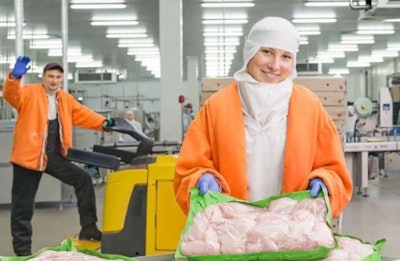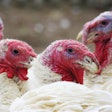
Animal welfare and food safety continue to be key focus areas for Myronivsky Hlibroproduct (MHP). This is according to Dr. John Rich, who is executive chairman of the board of MHP in the firm’s recently published Sustainability Report 2020.
MHP is a leading vertically integrated poultry producer and processing. With its headquarters in Cyprus, the company is based in Ukraine. In addition, it European poultry operation (Perutnina Ptuj, PP), centered in Slovenia has affiliates in six other central and eastern European countries.
MHP reduces antibiotic use on poultry farms
Among its commitments highlighted by Rich is a further reduction in the use of antibiotics during production.
MHP had aimed for 80% of its birds to be reared without antibiotics by 2023. Already in 2019, the firm was delivering ahead of schedule, with 20% of the flock without these medications against a planned figure of 15%. In 2020, the firm reports that 50% of the birds were reared without treatment compared to the 30% originally foreseen.
Independent audits at two of the firm’s premises show that antibiotics are only used when recommended by government veterinarians in order to comply with best animal welfare practice. Hormones and growth stimulants are not used at all.
To further improve poultry health, MHP has set up its own veterinary clinics in Bosnia and Herzegovina.
Progress on poultry welfare
In 2021, MHP plans to improve further living conditions for its poultry to ensure that they comply with the Five Freedoms.
Over the past year, MHP has updated its corporate animal welfare policy, reports Rich.
Looking ahead, focus will be on biosecurity measures in Ukraine in the light of avian flu outbreaks across Europe in 2020-21.
Using the “Virtual Zoo” system, MHP aims to improve monitoring of birds at all its rearing sites this year. In addition, more welfare-friendly lighting systems are planned for its poultry houses.
As well as compliance with animal welfare regulations, PP will continue to implement the use of lactic acid and probiotics in Slovenia as a means to reduce further antibiotic use.
Poultry rearing at MHP
In Ukraine, 74% of MHP’s broilers are Cobb birds, while the rest are Ross. These figures are 84% and 16%, respectively, in the firm’s European operations. Both sources of genetics offer the characteristics of “welfare-friendly growth rate and feed efficiency,” according to the MHP report. At PP, roughly equal numbers of turkeys reared were of the BUT Big 6 and Converter breeds last year.
In 2020, the firm’s Ukrainian operations placed 427.4 million poultry, and slaughtered 412.7 million, giving a liveability of 96.5%. Total liveweight of birds slaughtered was just under 1.0 million metric tons.
For the European Operating Segment, 53.6 million birds were slaughtered, producing 112,000 metric tons (mt) liveweight destined for standard products, and 1,900mt for premium products. Liveability rate was 95.6% for the 55.4 million birds placed.
MHP becomes approved supplier to McDonald’s (Ukraine)
In 2020, Myronivsky Meat Processing Plant Lehko — a separate division of PJSC Myronivsky plant for the production of animal feed and grains — became a supplier of poultry meat to McDonald’s in Ukraine. This followed an independent audit to meet the requirements of the McDonald’s Supplier Quality Management System (SQMS) and Good Manufacturing Practice (GMP).
Subsequently, PJSC Myronivska Poultry Farm and affiliate Poultry Complex LLC Vinnytsia were also audited for compliance with McDonald’s standards as suppliers of raw materials. The inspections covered the issues of Good Manufacturing Practice (GMP) and Hazard Analysis and Critical Control Points (HACCP), as well as animal health and welfare.
As a result, these businesses have now been added to McDonald’s list of Approved Suppliers of raw materials in Ukraine.
Other highlights from MHP’s Sustainability Report
Becoming climate-neutral by 2030 is among the key points highlighted by MHP. One of the company’s achievements to this end was a 3% reduction in fuel consumption in 2020 compared to the previous year.
Reflecting the importance the firm sees in non-financial aspects of its operations, it has established a committee to oversee Environmental, Social and Governance (ESG) sustainability. Among its key functions is to involve MHP’s stakeholders in the promotion of sustainable development promotion, and the integration of ESG into the firm’s businesses.
Across the regions of its operations, MHP will also be pursuing closer cooperation with local communities.
Among these is a “culinary transformation,” in which MHP inaugurated Ukraine’s largest R&D and culinary center in mid-2020. Located near the capital city, Kiev, its aim is to train professional chefs to work with the firm’s products.
Finally, in what it reports to be the largest such project in Eastern Europe, MHP has launched a major digital transformation.
Overview of MHP’s business challenges in 2020
Risk mitigation, rapid adaptation, and innovation were the main challenges faced by MHP in 2020.
These were identified by Rich in his comments on the firm’s latest Sustainability Report. He attributed the continuation of operations despite the coronavirus COVID-19 pandemic to the company's people, established processes, and relations with suppliers and communities.
Reflecting these challenges, MHP’s total revenue in 2020 was down 7% year on-year at US$1.911 million. At US$1.016 billion, export revenue was 14% lower than the previous year, while adjusted Earnings Before Interest, Taxes, Depreciation and Amortization (EBITDA) was down 10% at US$340 million compared to 2019.
More on Ukraine’s poultry meat industry
Since the start of 2020, shrinking margins and constrained exports have impacted Ukraine’s poultry industry, according to an article in the June issue of Poultry International. However, those producers that are able to survive may experience better times ahead.
Last year, the sector was adversely impacted by the effects of both the COVID-19 pandemic, and a series of outbreaks of highly pathogenic avian influenza in Ukraine. Having expanded during 2019, the country’s largest poultry producer MHP reported a return to full operating capacity by the end of last year.
Earlier this year, the USDA Foreign Agricultural Service (FAS) reported that production had been halted at Ukraine’s second largest chicken meat producer, Complex Agromars. The source blamed poor management and the absence of a financial safety net. Towards the end of 2020, the firm’s operations were slowing down. By the end of the year, poultry meat production there stopped altogether. At the time, FAS foresaw little chance of a resumption of Agromar’s business.















